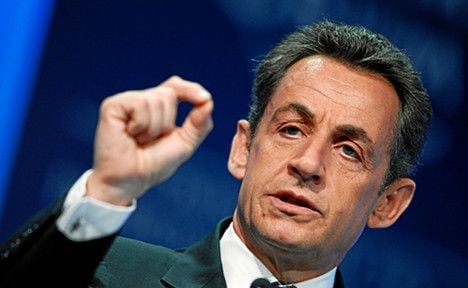Global markets were expected to face pressure when they reopen on Monday after Standard & Poor’s stripped France and Austria of their top triple-A ratings and downgraded a swathe of debt-laden EU members.
Friday’s downgrades had been mostly expected, but analysts said the move showed the eurozone debt crisis was worsening.
The downgrade means France will now have to pay more to borrow on international money markets, which could raise the cost of borrowing for businesses and households and dampen already faltering economic growth.
Sarkozy, in his first public reaction to the downgrade, made an appeal on Sunday for calm and said he would make more reforms to get France back on track.
“The crisis can be overcome provided that we have the collective will and the courage to reform our country,” he said at a memorial service for a former prime minister in the central town of Amboise.
“We must resist, we must fight, we must show courage, we must remain calm,” said the right-wing leader, whose reelection hopes in a presidential vote three months from now took a severe blow with the downgrade.
Sarkozy, who has promised there will be no further austerity packages this year, said he would make an address to the nation at the end of the month to tell the French about “the important decisions that need to be made without delay”.
He was due on Wednesday to host a “social summit” with unions and employers to try to make France’s job market more flexible and halt rising unemployment, which is nearing the three-million mark.
His government has promised to cut payroll charges on employers and workers to try to make French firms more competitive, and to recoup the revenue mainly by raising value added tax.
Sarkozy has also vowed to quickly impose a new tax on financial transactions, a move which has irked his European partners.
The president made no mention in his speech in Amboise of Friday’s downgrade by Standard & Poor’s, which cut France’s top triple-A credit rating, which it has held since 1975, by one notch to AA+.
His main opponent in the presidential race, the Socialist Francois Hollande, said Saturday that Sarkozy had staked his reputation on keeping the top credit rating but now, he said, it was clear that he had failed miserably.
Analysts said the downgrade of France has widened a gulf between Europe’s north and south, leaving Paris politically weaker and Berlin stronger amid tough negotiations to resolve the eurozone crisis.
Sarkozy — who hosted crisis talks with his top economics ministers at the Elysee on Friday — reportedly told allies last month: “If we lose the triple-A, I’m dead.”
He had staked his re-election bid on convincing voters that he was the only candidate with the stature and experience to save France from economic meltdown.
Sarkozy justified pushing through two austerity packages as necessary to defend France’s triple-A rating.
An IFOP poll on Thursday showed that in the first round of the election in April, Hollande would take 27 percent of the vote, followed by Sarkozy at 23.5 percent and far-right National Front leader Marine Le Pen at 21.5 percent.
Friday’s downgrade left a sizeable hole in Sarkozy’s reelection campaign.
“It is the end of the myth of the protecting president,” said Le Pen.
The downgrade added to already bleak economic figures for France.
INSEE, the national statistics office, says it expects France to fall into a brief recession, with the economy contracting 0.2 percent in the three months to December and another 0.1 percent in the first quarter of 2012.
S&P said the downgrade of France “reflects our opinion of the impact of deepening political, financial, and monetary problems within the eurozone”.



 Please whitelist us to continue reading.
Please whitelist us to continue reading.
Member comments